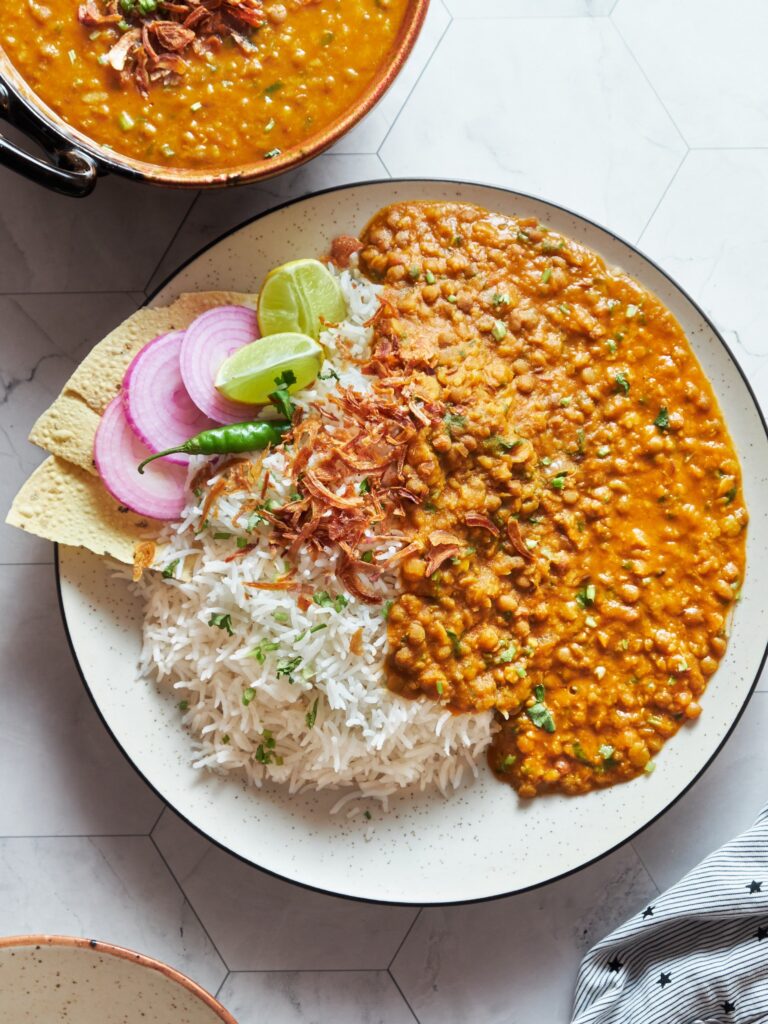
Sponsored By

This is an unsponsored, ad-free recipe. If you’d like to support my work, please consider:
Thank you! 💜 😊
Dal Chawal is a classic dish in Indian cuisine, offering a wholesome and satisfying meal that combines rice and lentils. This comfort food is enjoyed across India and other South Asian countries, with various regional variations. The dish is typically made by pairing perfectly cooked rice with a flavorful dal made from a mix of toor dal (yellow pigeon peas) and masoor dal (brown lentils). The dal is cooked with aromatic spices, creating a rich, savory broth that complements the simplicity of the rice.
To prepare the rice, basmati rice is gently rinsed to remove excess starch, ensuring a fluffy texture once cooked. The rice is then simmered with salt and coconut oil, which adds a subtle richness to the dish. Once cooked, the rice is left to rest, enhancing its texture and allowing it to fully absorb any residual moisture, resulting in soft, separate grains.
The dal is prepared by cooking the lentils with a blend of spices, including cumin, turmeric, coriander, and Kashmiri red chili powder. These spices are first sautéed with onions, garlic, ginger, and green chili, creating a fragrant base for the dal. Tomato puree, dried mango powder (amchur), and salt are then added to the mixture, providing depth of flavor and a slight tanginess. The soaked lentils are added to this aromatic base, and the dal is cooked to a tender consistency in a pressure cooker.
Once both components are ready, the dal and rice are served together, often accompanied by crispy papad, fresh onion slices, lemon wedges, and green chilies. These add-ons provide a contrast in texture and flavor, elevating the overall meal. The recipe is versatile, allowing for adjustments in spice levels and consistency based on personal preference. For a thicker dal, less water is added, while a more soupy consistency can be achieved by increasing the liquid.
Dal Chawal is not only a staple for its taste but also for its nutritional value. The lentils offer a good source of plant-based protein, while the rice provides essential carbohydrates. The combination of these two ingredients, along with the aromatic spices, makes for a balanced and nourishing meal suitable for any occasion.
To prepare Chawal (Rice),
To prepare Dal (Lentil),
Add-ons:
Step A : Prepare rice
Step B : Prepare dal
Step C : Serve!
Yes, you can use other types of long-grain rice, but cooking times and water ratios may vary. Adjust water as needed and check for doneness by tasting near the end of the cooking time.
To make the recipe oil-free, omit the coconut oil in the rice and sauté the spices for the dal in a splash of vegetable broth instead of oil. Stir frequently to prevent sticking.
Yes, both the rice and dal can be made ahead of time. Store them separately in airtight containers in the fridge for up to 3 days. Reheat with a bit of water to prevent the dal from drying out.
If you don’t have hing, you can omit it.
Canned lentils can work in a pinch, but they won’t have the same texture. Skip the soaking step, rinse the lentils, and reduce the cooking time to avoid overcooking.
To make the dal spicier, add extra green chilies, use a spicier chili powder, or include a pinch of red chili flakes. Adjust based on your spice tolerance.
Yes, you can make the dal in a slow cooker by following the sauté steps on the stovetop first, then transferring everything to the slow cooker and cooking on low for 4-5 hours or until the dal is tender.
Reheat dal on the stovetop over medium heat with a splash of water to restore its consistency. Rice can be reheated in the microwave or on the stovetop with a few drops of water to prevent it from drying out.
You can increase protein by adding more lentils, stirring in cooked chickpeas, or serving the dal chawal with a side of roasted or sautéed tofu or tempeh.
Try these delicious ideas:
Great100%
Good0%
Decent0%
Bad0%
Terrible0%
No similar recipes found.
Stay tuned.
Subscribe to my newsletter
One newsletter a week. No spam.
This form is protected by reCAPTCHA.
Google Privacy Policy and Terms of Service apply.